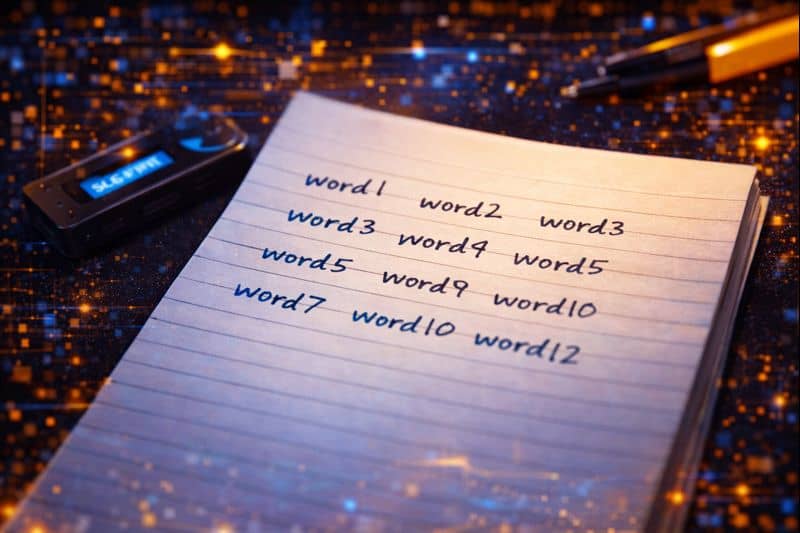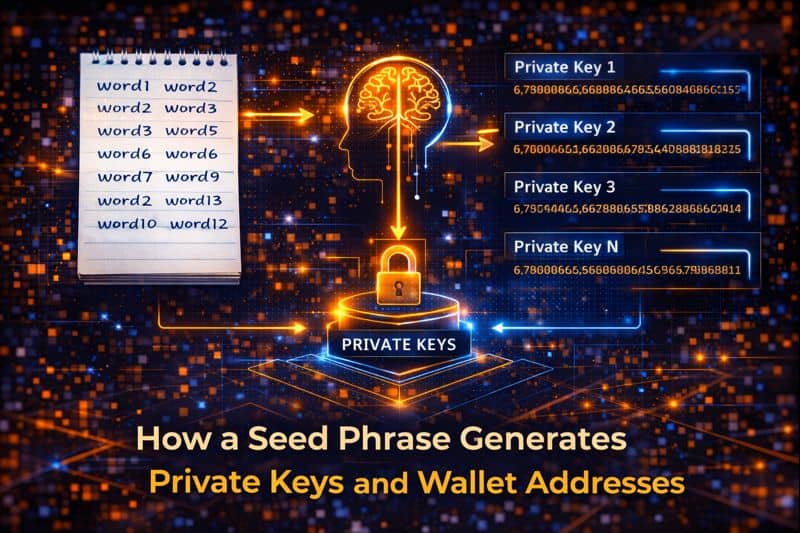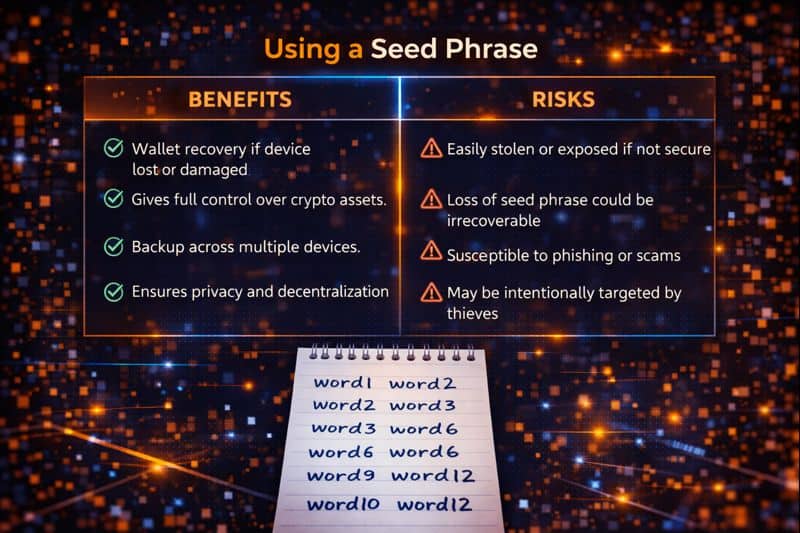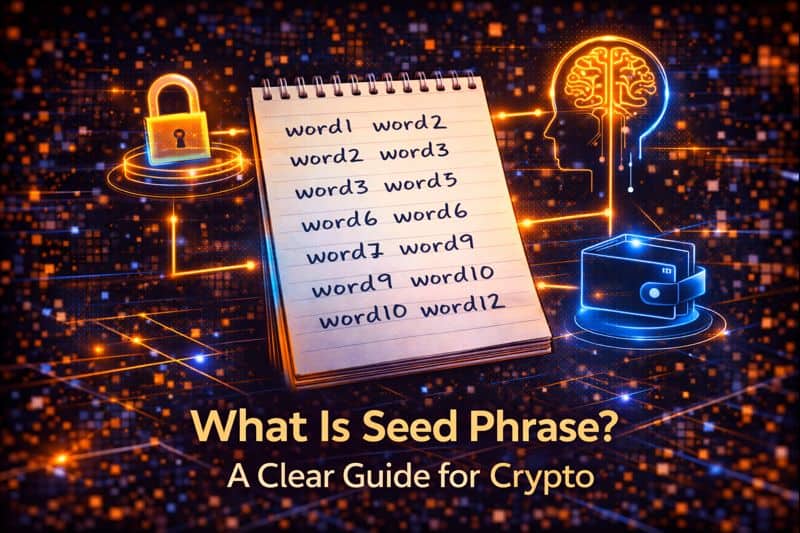What Is Seed Phrase is one of the most important questions for anyone entering the Cryptocurrency space. As more people store and manage assets on their own, understanding wallet security has become essential. A seed phrase is the foundation of that security. It gives users full control over access, recovery, and ownership of their digital funds.

Unlike traditional banking, crypto places responsibility directly on the user. There is no password reset or customer support that can restore lost access. Because of this, seed phrases play a critical role in protecting Digital Currency. They act as the single backup that can recover a wallet if a device is lost, damaged, or replaced.
This article explains Seed Phrase in a simple and accurate way. You will learn how seed phrases work, where they came from, and why they are central to modern wallet design. It also explores their types, advantages, risks, and real-world uses within the broader Blockchain ecosystem.
What Is Seed Phrase?
Seed Phrase refers to a series of randomly generated words that store the information needed to recover a crypto wallet. These words represent encoded data that allows a wallet to recreate private keys and regain access to funds. Most wallets generate it when they are first created.
The primary purpose of a seed phrase is recovery. If a phone, computer, or hardware wallet is lost or damaged, the seed phrase can restore the wallet on another device. Without it, funds are usually unrecoverable. This design removes reliance on third parties and gives users complete control.
Seed phrases fit into the crypto industry as a core part of self-custody. Instead of trusting banks or platforms, users manage access themselves. This approach increases independence but also raises responsibility. Anyone who has the seed phrase can control the wallet and move its funds.
For that reason, seed phrases must be stored securely and never shared. They are not usernames or passwords. They are the wallet itself.
Background of Seed Phrase
A seed phrase may look simple, but it relies on advanced cryptographic standards. Behind each word is structured data that links directly to wallet keys and addresses. This system was created to balance strong security with usability.
Each of it uses words from a predefined list. These words follow strict rules so wallets can interpret them correctly. When entered into compatible software, the phrase recreates the same private keys every time. This consistency allows recovery across devices and platforms.
List of Key Components or Aspects:
- A fixed number of randomly generated words
- A standardized word list for compatibility
- A link to private key and address generation
- Offline recovery without internet access
- Full user responsibility for storage and safety
These elements make seed phrases both powerful and risky. When stored correctly, they provide unmatched control. When mishandled, they can lead to permanent loss.
History of Seed Phrase
Seed phrases emerged as crypto wallets evolved beyond early technical tools. In the early days, users backed up individual private keys. This method was difficult to manage and easy to lose. Developers recognized the need for a simpler recovery system.
The solution was to encode wallet data into human-readable words. This made backups easier to write down and less prone to error. Over time, standardized systems were developed so seed phrases could work across multiple wallets.
As crypto adoption increased, seed phrases became the default recovery method. Wallet providers adopted shared standards to improve compatibility and user experience. This shift played a major role in making crypto more accessible to everyday users.
| Year | Key Milestone |
|---|---|
| 2012 | Early wallet backup methods introduced |
| 2013 | Word-based recovery concepts gain use |
| 2014 | Standardized recovery phrases adopted |
| 2017+ | Seed phrases become industry standard |
Today, seed phrases are considered essential knowledge for anyone managing a crypto wallet.
Types of Seed Phrase
Seed phrases come in several formats, depending on wallet design and security level. The most common type uses 12 words. This format offers strong protection while remaining easy to store and manage. Many beginner wallets use this option.
Another widely used format is the 24-word seed phrase. This version increases security by expanding the number of possible combinations. It is often recommended for users holding larger amounts or seeking higher protection.
Some wallets allow an additional passphrase to be added to the seed phrase. This creates an extra layer of security. However, it also increases complexity. If the extra passphrase is forgotten, recovery becomes impossible.
Regardless of type, all seed phrases function the same way. They recreate the same wallet data when entered correctly, giving full access to funds.
How Does it Work?

A seed phrase works through a clear and repeatable process. First, a wallet generates random data during setup. This data is converted into a list of readable words and shown to the user. The user must then record the phrase securely.
Next, the wallet uses this to generate private keys and wallet addresses. These keys control ownership and transaction approval. The wallet does not store the phrase on servers or accounts.
If recovery is needed, the user enters the seed phrase into compatible wallet software. The software regenerates the same keys and restores access. This process does not require identity verification or third-party approval.
Because of this design, possession equals control. That makes secure storage critical and mistakes costly.
Pros and Cons
Seed phrases provide strong advantages, but they also introduce serious risks if not handled carefully. Understanding both sides helps users make informed decisions.
| Pros | Cons |
|---|---|
| Full control over wallet recovery | Permanent loss if phrase is lost |
| No dependence on third parties | Total access if stolen |
| Works across compatible wallets | Requires strict storage discipline |
These trade-offs reflect the core principle of crypto ownership. Freedom increases responsibility.

Uses of Seed Phrase
Seed phrases are used wherever self-custody wallets are involved. They support many real-world scenarios within the crypto ecosystem.
Wallet Recovery
Seed phrases allow users to restore wallets after device loss, damage, or upgrades. This use case is the most common and essential.
Asset Migration
Users can move wallets between applications or devices by entering the same seed phrase. Funds remain intact without needing transfers.
Security and Risk Management
Experienced users often store seed phrases offline to reduce exposure during Trading activity. This practice limits online attack risks while maintaining access control.
In every application, the seed phrase remains the single point of authority over wallet access. Proper handling determines whether it is a safeguard or a vulnerability.
Resources
Money On Chain. What Is a Seed Phrase?
NFT Plazas. What Is a Seed Phrase in Crypto?
Changelly. Seed Phrase Explained
Coinbase. What Is a Seed Phrase?
Cointelegraph. What Is a Seed Phrase and Why Is It Important?

